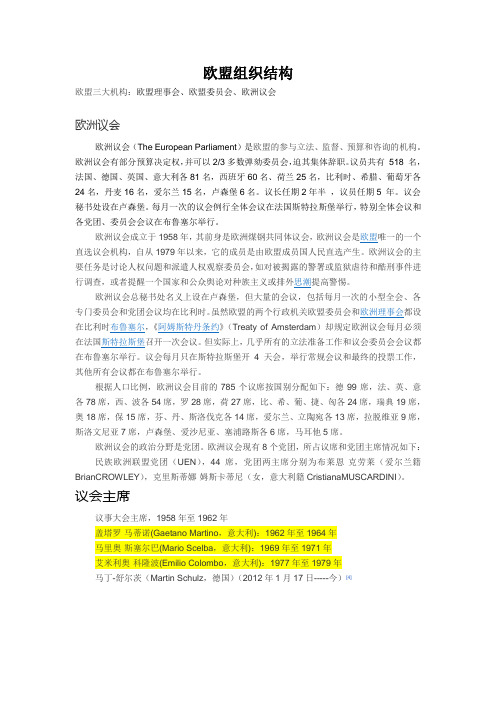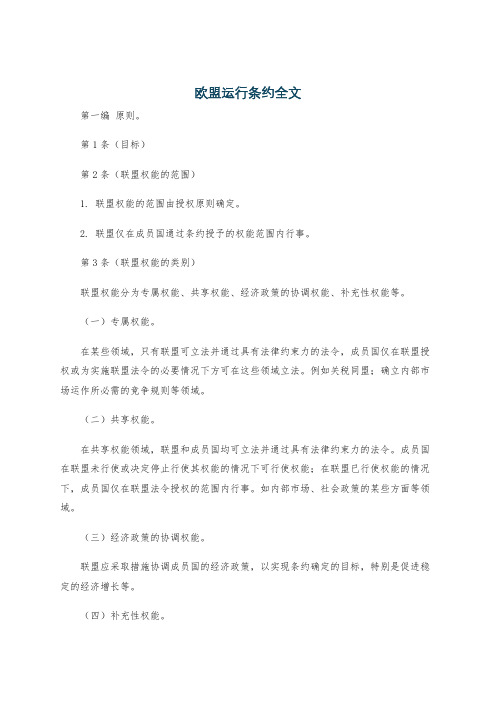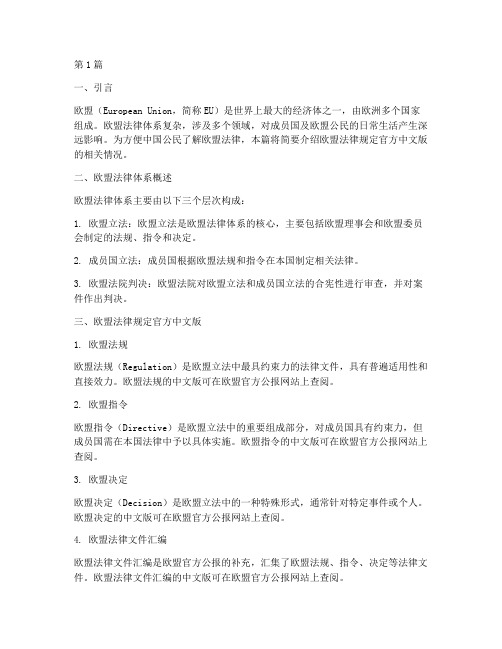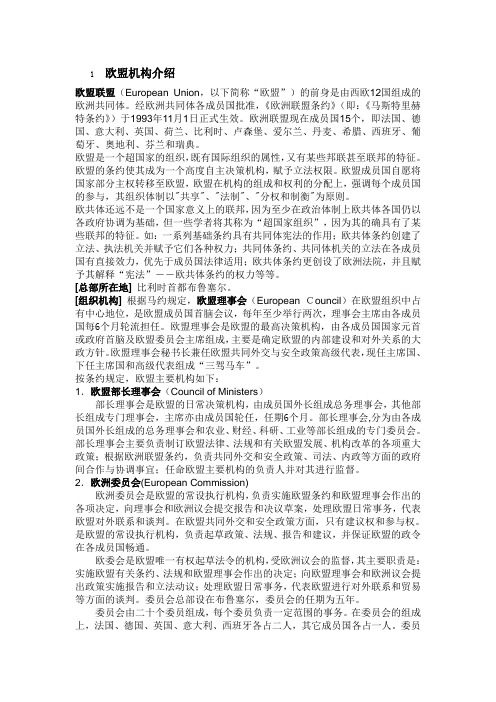欧盟运作条约:结构和解释 TFEU Structure and Interpretation
《欧洲联盟运行条件》114条适用条件

《欧洲联盟运行条件》114条适用条件概述欧洲联盟(E ur op ean U ni on,简称E U)是由28个成员国组成的政治经济联盟。
为了确保联盟的顺利运行,欧盟设立了一系列的运行条件。
本文将介绍《欧洲联盟运行条件》中的114条适用条件,旨在帮助读者更好地了解欧盟的工作原则和运行机制。
第一章宪法框架与基本法律1.第一部分:欧洲联盟宪法的制定和修改2.第二部分:欧盟基本法律的法律地位-2.1欧盟基本法律的构成要素-2.2欧盟基本法律的修正程序-2.3欧盟基本法律的适用和效力第二章政治机构与决策机制1.欧洲理事会的角色和职能2.欧洲理事会主席的选举和任期3.欧洲委员会的组成和职责4.欧洲议会的议员选举制度5.欧洲议会的议事规则和决策程序6.欧盟法院的司法管辖权和法官任命第三章经济政策与市场规则1.欧洲联盟的共同市场原则-1.1欧盟成员国的商品自由流通-1.2欧盟成员国的劳动力自由流动-1.3欧盟成员国的资本自由流动2.欧盟的经济政策协调机制-2.1欧盟成员国的财政政策协调-2.2欧盟成员国的货币政策协调-2.3欧盟成员国的经济结构政策协调3.欧盟的竞争政策和反垄断规定4.欧盟与非成员国的贸易关系第四章社会政策与人权保障1.欧盟的劳动力和社会保护政策-1.1欧洲劳工权益保护法-1.2欧洲社会福利制度2.欧盟的环境保护政策-2.1欧盟对气候变化的应对措施-2.2欧盟对环境污染的防治措施3.欧盟成员国的公民权利和人权保护-3.1欧洲人权公约的适用范围-3.2欧盟成员国公民的自由权利保护第五章外交与安全政策1.欧盟的共同外交与安全政策原则2.欧盟与成员国之间的外交协调机制3.欧盟对外援助政策和国际合作机制4.欧盟的联合国事务和国际安全事务参与5.欧盟对非洲、亚洲和拉美国家的政策第六章适用条件的执行和违约责任1.欧盟成员国对欧盟法规的执行2.欧盟成员国的违约责任和处罚机制3.欧盟委员会的违约调查和裁决程序结论本文对《欧洲联盟运行条件》中的114条适用条件进行了详细介绍,涵盖了欧盟的宪法框架与基本法律、政治机构与决策机制、经济政策与市场规则、社会政策与人权保障、外交与安全政策以及适用条件的执行和违约责任等方面。
欧盟主要机构及运作机制

欧盟主要机构及运作机制随着欧盟成员国越来越多地将决策权交给欧盟,其权力正稳步扩大,而很多从事国际经贸或国际政治的人士对欧盟的基本运作机制还缺乏基本的了解。
那么欧盟的各机构是如何运作的呢?二战结束以来,欧洲各国一直在为实现和平与经济增长寻求加强欧盟一体化程度。
近年来随着成员国越来越多地将决策权交给欧盟,欧盟机构的权威正稳步加强。
但是从2008年全球金融危机,到前所未有的非洲和中东移民问题,再到英国脱欧,欧盟一直面临重重危机。
当今欧盟是世界舞台上的强大参与者,但其机构复杂众多,常常令人困惑。
下面就将详细介绍欧盟的主要机构以及他们的运作方式。
一、欧盟的主要机构20世纪50年代欧洲一体化开始形成,现在的欧盟于1992年《马斯特里赫特条约》签订后成立。
2007《里斯本条约》条约签订(又称《改革条约》),欧盟才获得了现有的结构和权力。
根据这些条约,欧盟28个成员国同意集中主权,同时将许多决策权授予欧盟。
根据行政、立法、司法和财务职能,欧盟大致分为七个官方机构。
1、欧洲理事会。
欧洲理事会是欧盟最高政治领导人集团,由每个成员国的总统或总理组成。
理事会首脑会议用于确定欧盟的大致发展方向,解决紧迫的高级别问题。
理事会主席由成员国选举得出,每届最长任期两年半。
2、欧盟委员会。
欧盟委员会是欧盟的主要执行机构,拥有最多的日常权力。
委员会负责法律提案、预算管理、决策执行和法规颁布,并在世界各峰会、谈判和国际组织中代表欧盟。
委员会成员由欧盟理事会任命,并由欧洲议会批准。
3、欧洲议会。
欧洲议会是唯一通过直接选举产生的欧盟机构,其成员由每个成员国人民选举的代表组成。
与传统的立法机构不同,欧洲议会不能提出立法动议,但如果一项法律未能得到议会批准就无法获得通过。
议会还负责谈判和批准欧盟预算,并监督欧盟委员会。
4、欧盟理事会。
为防混淆欧盟理事会也称为部长理事会,是欧盟的第二个立法机构,一项法律也需要该机构批准才能获得通过。
根据政策领域不同,该委员会由所有欧盟成员国政府部长组成。
欧洲联盟运作方式条约

欧洲联盟运作方式条约一、引言欧洲联盟(European Union,简称EU)是一个由28个成员国组成的政治和经济联盟。
为了确保成员国之间的合作和协调,欧盟制定了一系列条约和法律来规范其运作方式。
其中最重要的一份文件就是欧洲联盟运作方式条约(Treaty on European Union),也被称为《马斯特里赫特条约》(Treaty of Maastricht)。
本文将详细介绍欧洲联盟运作方式条约的背景、内容和影响。
二、背景随着二战结束后欧洲国家之间的合作步伐加快,1957年签署的《罗马条约》奠定了欧洲经济共同体(EEC)的基础。
随着时间推移,原有的经济共同体逐渐发展为更加广泛的政治和经济合作组织,最终形成了现在的欧洲联盟。
为了更好地适应新形势下的合作需求,1992年签署了《马斯特里赫特条约》,该条约正式生效于1993年11月1日。
该条约对欧洲联盟的组织结构、权力分配和政策制定等方面进行了重大改革。
三、条约内容《马斯特里赫特条约》涵盖了许多方面的内容,包括欧洲联盟的目标、机构设置、权力分配、政策制定和经济合作等。
1.欧洲联盟的目标:条约明确了欧洲联盟的目标,包括促进和加强成员国之间的经济和社会进一步整合,推动共同外交和安全政策,以及保护人权和民主原则。
2.机构设置:条约规定了欧洲联盟的主要机构,包括欧洲委员会、欧洲议会、理事会和法院等。
这些机构负责制定政策、决策和监督执行情况。
3.权力分配:条约明确了各个机构之间的权力分配和合作关系。
例如,欧洲委员会负责提出立法建议,欧洲议会负责审议并投票决定是否通过。
理事会则负责协调成员国之间的利益,并最终做出决策。
4.政策制定:条约规定了欧洲联盟在各个政策领域的职责和权限。
例如,共同决策程序适用于内部市场、环境保护、人权和竞争政策等领域。
5.经济合作:条约强调了成员国之间的经济合作,包括货物、服务、资本和劳动力的自由流动。
此外,条约还规定了共同农业政策、区域发展基金和结构基金等经济合作机制。
欧盟法律组成

欧盟法一、立法机关欧洲联盟理事会原称部长理事会,是欧共体的决策机构,拥有欧共体的绝大局部立法权。
二、欧盟法构成所谓欧盟法,指以建立欧盟、规制欧盟各国的国际条约为核心而建立起来的,包含欧盟自己为实施条约而制定的各项条例、指令、决定和判例以及欧盟各国的相关国内法,旨在调整欧盟各国对内和对外关系的国际法和国内法标准的总称,是一个将国际条约的内容逐渐开展成为国内法标准的法律体系。
以立法模式为划分标准,欧盟法律体系包含了以下三个层面: 首先,欧盟法体系包含成立欧盟及其前身欧共体的国际条约以及后续修改的一系列条约, 在欧盟法这个层面上,欧盟成立所依据的国际条约以及对其修改的条约的性质是国际法。
它由作为欧盟及其前身欧洲共同体成员的各缔约国制定,由各缔约国按条约规定的程序批准生效。
与具有普遍约束力的国内法不同,它只对缔约国产生特定法律约束力,产生所缔结条约约定事项的国家责任,具有国际法的全部特性。
其次,欧盟法包含欧洲议会、部长理事会等欧盟主要机构依据根本条约,以解释条约和执行条约的方法制定的,具有国内法属性的条例、指令、决定等法规及欧洲法院的判例。
欧盟立法机构公布的法规主要有以下几种: (1)条例,它具有普遍意义,各个组成局部都具有约束力,可以直接适用于全部成员国; (2)指令,它所规定的应到达何种结果的要求,对任何接受指令的成员国都具有约束力,但应采取何种形式或方法,由有关成员国决定; (3)决定,它仅对所下达的有关对象具有拘束力。
上述三种形式的法规,是欧盟法的重要渊源。
就调整的领域而言,这局部法规是对各成员国国内公权力行使的规制,涉及关税同盟、货币政策、环境爱护、竞争规则、商业政策等诸多领域;就内容而言,最能反映欧洲联盟一体化的开展与变化。
因此,从某种意义上讲,这一局部法规是欧盟法最主要的渊源。
它的效力高于各成员国的国内立法,但要在构建欧盟的各项国际条约的框架内作出,其解释依据X于国际条约。
欧盟法院的判例也是欧盟法的重要X。
欧盟组织结构.

欧盟组织结构欧盟三大机构:欧盟理事会、欧盟委员会、欧洲议会欧洲议会欧洲议会(The European Parliament)是欧盟的参与立法、监督、预算和咨询的机构。
欧洲议会有部分预算决定权,并可以2/3多数弹劾委员会,迫其集体辞职。
议员共有518 名,法国、德国、英国、意大利各81名,西班牙60名、荷兰25名,比利时、希腊、葡萄牙各24名,丹麦16名,爱尔兰15名,卢森堡6名。
议长任期2年半,议员任期5 年。
议会秘书处设在卢森堡。
每月一次的议会例行全体会议在法国斯特拉斯堡举行,特别全体会议和各党团、委员会会议在布鲁塞尔举行。
欧洲议会成立于1958年,其前身是欧洲煤钢共同体议会,欧洲议会是欧盟唯一的一个直选议会机构,自从1979年以来,它的成员是由欧盟成员国人民直选产生。
欧洲议会的主要任务是讨论人权问题和派遣人权观察委员会,如对被揭露的警署或监狱虐待和酷刑事件进行调查,或者提醒一个国家和公众舆论对种族主义或排外思潮提高警惕。
欧洲议会总秘书处名义上设在卢森堡,但大量的会议,包括每月一次的小型全会、各专门委员会和党团会议均在比利时。
虽然欧盟的两个行政机关欧盟委员会和欧洲理事会都设在比利时布鲁塞尔,《阿姆斯特丹条约》(Treaty of Amsterdam)却规定欧洲议会每月必须在法国斯特拉斯堡召开一次会议。
但实际上,几乎所有的立法准备工作和议会委员会会议都在布鲁塞尔举行。
议会每月只在斯特拉斯堡开4天会,举行常规会议和最终的投票工作,其他所有会议都在布鲁塞尔举行。
根据人口比例,欧洲议会目前的785个议席按国别分配如下:德99席,法、英、意各78席,西、波各54席,罗28席,荷27席,比、希、葡、捷、匈各24席,瑞典19席,奥18席,保15席,芬、丹、斯洛伐克各14席,爱尔兰、立陶宛各13席,拉脱维亚9席,斯洛文尼亚7席,卢森堡、爱沙尼亚、塞浦路斯各6席,马耳他5席。
欧洲议会的政治分野是党团。
欧洲议会现有8个党团,所占议席和党团主席情况如下:民族欧洲联盟党团(UEN),44席,党团两主席分别为布莱恩·克劳莱(爱尔兰籍BrianCROWLEY),克里斯蒂娜·姆斯卡蒂尼(女,意大利籍CristianaMUSCARDINI)。
欧洲联盟运作体系-Europa

策的体系。为管理这个体系成立的共同体机
构于1967年合并,形成一个委员会和一个理 事会。
欧洲经济共同体除了扮演经济角色,还逐渐
共同体 领域(大 多数共同 体政策领
域)
共同 外交和 安全政策
警察 和司法 在打击 犯罪上 的合作
承担范围更广泛的责任,包括社会、环境和
地区政策。由于它不再是一个纯粹的经济共 同体,第四 项条 约(马斯 特里 赫 特 条 约) 把它 更名为“欧洲共同体”(EC)。《欧洲煤钢共
欧洲经济和社会委员会:
代 表 民 众 社 会 的 声 音 31 . . . . . . . . . . . . . . . . . . . . . . . . . . . . . . . . . . . . . . . . . . . . . . . . . .
欧洲议会:
代 表 民 众 的 声 音 11 . . . . . . . . . . . . . . . . . . . . . . . . . . . . . . . . . . . . . . . . . . . . . . . . . . . . . . .
欧洲中央银行:
管 理 欧 元 37 . . . . . . . . . . . . . . . . . . . . . . . . . . . . . . . . . . . . . . . . . . . . . . . . . . . . . . . . . . . . . .
欧盟部长理事会:
代 表 成 员 国 的 声 音 15 . . . . . . . . . . . . . . . . . . . . . . . . . . . . . . . . . . . . . . . . . . . . . . . . . . . . .
欧盟法与国际一体化的法律框架与机制

随着欧盟经济一体化的深入发展,一些传统的国际法规则已无法适应新的经济形势,需 要进行相应的调整和完善。
欧盟经济一体化对国际经济法的影响
欧盟经济一体化的实践对国际经济法产生了深远影响,推动了国际经济法的发展和创新 ,如国际贸易法、国际投资法等领域的新规则和新制度。
04
02
通过制定统一的竞争规则、标准化和互认制度等,欧盟法推动
了成员国市场的整合,促进了商品和服务的自由流通。
欧盟法推动投资便利化
03
欧盟法规定了成员国之间投资自由化的原则和规则,简化了投
资手续,提高了投资效率。
欧盟经济一体化对国际法的影响
欧盟经济一体化对国际法体系的贡献
欧盟经济一体化的实践丰富了国际法的内容,推动了国际法体系的发展和完善。
欧盟法特点
欧盟法具有超国家性、直接适用性和优先适用性等显著特点。超国家性体现在欧盟法能 够直接对成员国及其公民产生权利和义务,而无需借助成员国的国内立法程序;直接适 用性意味着欧盟法在成员国境内可以直接适用,无需通过成员国的国内立法转化;优先
适用性则表明在成员国国内法与欧盟法发生冲突时,应以欧盟法为准。
02
国际一体化法律框架
国际一体化法律框架概述
01 02
国际一体化法律框架的定义
国际一体化法律框架是指在国际层面上,通过制定和实施一系列国际条 约、协定和规则,以促进不同国家间在经济、政治、文化等领域的合作 与融合的法律体系。
国际一体化法律框架的目标
该框架的主要目标是推动全球范围内的合作与发展,减少国家间的差异 和冲突,增进国际社会的整体福祉。
欧盟法对国际法的影响
欧盟法的出现和发展对国际法产生了深远影响。首先 ,欧盟法推动了国际法主体的多元化,使得国际组织 等非国家行为体在国际法中的地位和作用日益凸显; 其次,欧盟法促进了国际法规则的完善和发展,为国 际法的编纂和逐渐发展提供了新的动力和源泉;最后 ,欧盟法还推动了国际法实施机制的改革和创新,为 国际争端的和平解决提供了新的途径和方式。
欧盟法律制度

欧盟公共企业领域的反垄断法律制度翟巍2014/9/18 8:54:30点击率[415]评论[0] Fehler! Hyperlink-Referenz ungültig.【法宝引证码】CLI.A.086619【学科类别】反不正当竞争与反垄断法【出处】《法学》2014年第6期【写作时间】2014年【中文摘要】公共企业领域行政垄断与行政扶持行为均包括财政补贴、特许经营等措施,具有一定程度的形式相似性。
欧盟反垄断法律制度对这两类行为给予了区别规制。
一方面,基于附属理论严格禁止作为企业垄断行为诱因或强化因素的行政垄断行为;另一方面,政府为保障公共经济利益服务而实施的对公共企业的行政扶持行为,得到了反垄断豁免。
在当前我国国企类型化改革背景下,明晰公共经济利益服务构成要件,借鉴欧盟反垄断法制模式,可有效厘清与区别规制国有公共企业领域的行政垄断与行政扶持行为。
【中文关键字】欧盟;公共企业;行政垄断;行政扶持【全文】[编者按]十八届三中全会通过的《中共中央关于全面深化改革若干重大问题的决定》拉开了新一轮改革的大幕,改革正步入攻坚区和深水区,同样,国企改革也进入到一个关键时期。
根据决定,国有资本要加大对公益性企业的投入,在提供公共服务方面作出更大贡献。
国有资本继续控股经营的自然垄断行业,要进一步破除各种形式的行政垄断。
将提供公共产品与公共服务的国有企业改制成为公共企业既是国企改革的理性回归,也是深化国企改革的最终目标。
同时,决定关于“完善国有资产管理体制,以管资本为主加强国有资产监管,改革国有资本授权经营体制,组建若干国有资本运营公司”的构想,也给国有企业管理体制和治理方式改革指明了方向。
要达到这些要求和目标,相应的制度安排和完善不可或缺。
鉴于此,本刊特组织“公共企业法制建设的国际借鉴”专题,对欧盟、法国、德国、新加坡公共企业的法制建设展开研究,其中既有基本理论的分析,也有管理方式的研究,既有成功经验的客观陈述,也有相关问题的如实反映,期望通过外国经验之借鉴为深化国企改革提供必要的参考。
2010年的欧盟运行条约

2010年的欧盟运行条约
2010年的欧盟运行条约是欧洲联盟历史上的重要里程碑,对欧盟的发展和运行产生了深远的影响。
本文将从多个角度来探讨这一条约的背景、内容和影响。
一、背景
2010年的欧盟运行条约(也称为《里斯本条约》)是欧洲联盟为了应对日益复杂的全球挑战而制定的。
此前的《尼斯条约》虽然在欧盟的发展中起到了一定作用,但也暴露出一些问题,亟需进行修订和完善。
因此,欧盟成员国决定启动一项全面的条约改革。
二、内容
2010年的欧盟运行条约在内容上进行了多项重要改革。
首先,它明确了欧盟的基本价值观和目标,包括推动和平、繁荣、自由和公正等。
其次,条约规定了欧洲联盟的机构设置和职权分配,以及成员国之间的合作方式。
此外,条约还加强了欧洲议会的地位,增加了欧洲公民的参与和民主监督的机会。
三、影响
2010年的欧盟运行条约对欧洲联盟的运行产生了深远的影响。
首先,条约的通过为欧盟提供了更加稳定和可预测的法律框架,有利于各成员国之间的合作和协调。
其次,条约强化了欧盟的外交和安全政策,使其在国际事务中发挥更加积极的作用。
此外,条约还加强了
欧盟对经济和社会领域的干预能力,促进了欧洲一体化的进程。
总结起来,2010年的欧盟运行条约是欧洲联盟发展史上的重要里程碑,为欧盟的发展和运行提供了稳定和可持续的法律基础。
它的内容和影响体现了欧盟成员国在面对全球挑战时的共识和努力。
我们相信,在未来的发展中,欧洲联盟将继续致力于维护和推动欧洲的繁荣和团结。
谷歌在欧洲_欧盟运行条约(TFEU)第102条视角下的谷歌垄断行为分析

谷歌在欧洲_欧盟运行条约(TFEU)第102条视角下的谷歌垄断行为分析谷歌在欧洲:欧盟运行条约(TFEU)第102条视角下的谷歌垄断行为分析引言:近年来,随着互联网和科技的迅猛发展,一些科技巨头企业也越来越受到关注。
谷歌作为全球最大的互联网搜索引擎之一,在欧洲市场上的垄断地位备受争议。
本文将从欧盟运行条约(TFEU)第102条的视角出发,对谷歌在欧洲市场上的垄断行为进行分析。
第一部分:谷歌在欧洲市场的垄断地位谷歌作为全球最大的搜索引擎,凭借其强大的搜索算法及丰富的搜索结果,占据了欧洲市场的绝大部分份额。
根据统计数据,谷歌在欧洲市场的搜索引擎市场份额高达90%以上,形成了明显的垄断地位。
谷歌的垄断地位主要基于其具有强大的技术能力和用户规模优势。
大量的用户倾向于使用谷歌作为默认搜索引擎,这给了谷歌极大的竞争优势。
而与此同时,谷歌通过不断更新和改进其搜索算法,提供更准确、个性化的搜索结果,迅速吸引了更多的用户,形成了正向的反馈循环。
第二部分:谷歌的垄断行为尽管谷歌在欧洲市场上占据了绝对的市场份额,但其垄断行为也引起了欧盟委员会的关注。
根据欧盟运行条约(TFEU)第102条,禁止滥用市场支配地位。
在此背景下,谷歌的一些行为被指控是滥用市场支配地位的体现。
首先,谷歌被指责使用其垄断地位来压制竞争对手。
谷歌的搜索结果往往将自家服务放在更显眼的位置,而将竞争对手的相关结果排名较低。
这种做法显然会使得用户趋向于点击谷歌自家服务,而降低竞争对手的曝光度,对竞争对手的生存和发展构成威胁。
其次,谷歌还被指责在广告市场上进行不正当竞争。
谷歌通过将其广告服务与搜索结果整合,并给予其自家服务和广告平台更多的曝光机会,从而排挤了其他广告平台的市场份额。
这种行为被认为阻碍了市场的公平竞争,对其他竞争对手形成了不公平的竞争优势。
第三部分:欧盟的反垄断行动与谷歌的应对面对谷歌的垄断行为,欧盟委员会采取了一系列的反垄断行动。
首先,欧盟委员会于2017年对谷歌罚款2.4亿欧元,指控其滥用市场支配地位。
欧洲联盟法名词解释

欧洲联盟法名词解释
欧洲联盟(European Union,简称EU)是一个由欧洲国家组
成的政治经济一体化组织。
其目标是促进成员国之间的经济合作、政治合作和社会合作,以实现持久和平、繁荣和发展。
以下是一些欧洲联盟法的名词解释:
1. 欧洲联盟条约(Treaty of European Union):也称为马斯特
里赫特条约,是欧洲联盟的基本法律文件,规定了欧盟的目标、原则、决策程序和机构等。
2. 欧洲联盟法(European Union law):欧洲联盟的法律体系,由欧盟法律法规和欧盟法院的判决构成。
这些法律适用于欧盟的成员国,对成员国的法律具有直接效力。
3. 欧洲联盟法庭(Court of Justice of the European Union,简称CJEU):欧洲联盟的司法机构,负责解释和适用欧盟法律、
处理成员国和欧盟机构之间的纠纷。
它由欧洲联盟法院和欧洲联盟普通法院组成。
4. 欧洲联盟内市场(Internal Market of the European Union):
指欧洲联盟成员国之间的自由贸易区,保障了货物、人员、服务和资本的自由流动。
它是欧盟的核心政策之一,旨在促进成员国之间的经济一体化。
5. 欧洲联盟委员会(European Commission):欧洲联盟的执
行机构,负责制定欧盟法律和政策、监督成员国的履约情况,
并管理欧盟的预算和资金。
这些名词是欧洲联盟法中常用的一些概念,它们在欧盟的决策和司法过程中起到重要的作用。
欧盟运行条约全文

欧盟运行条约全文第一编原则。
第1条(目标)第2条(联盟权能的范围)1. 联盟权能的范围由授权原则确定。
2. 联盟仅在成员国通过条约授予的权能范围内行事。
第3条(联盟权能的类别)联盟权能分为专属权能、共享权能、经济政策的协调权能、补充性权能等。
(一)专属权能。
在某些领域,只有联盟可立法并通过具有法律约束力的法令,成员国仅在联盟授权或为实施联盟法令的必要情况下方可在这些领域立法。
例如关税同盟;确立内部市场运作所必需的竞争规则等领域。
(二)共享权能。
在共享权能领域,联盟和成员国均可立法并通过具有法律约束力的法令。
成员国在联盟未行使或决定停止行使其权能的情况下可行使权能;在联盟已行使权能的情况下,成员国仅在联盟法令授权的范围内行事。
如内部市场、社会政策的某些方面等领域。
(三)经济政策的协调权能。
联盟应采取措施协调成员国的经济政策,以实现条约确定的目标,特别是促进稳定的经济增长等。
(四)补充性权能。
在补充性权能领域,联盟应在不超出必要范围的情况下,仅在成员国无法充分实现拟议行动目标的情况下,或因拟议行动的规模或影响而由联盟层面更好实现的情况下采取行动。
第4条(忠诚合作原则)1. 成员国应积极和无保留地支持联盟的共同外交与安全政策,并遵循联盟在这一政策框架内作出的决定。
2. 成员国应采取任何适当的措施,无论是一般性措施还是具体措施,以确保履行本条约规定的义务。
第二编非歧视与公民身份。
第18条(不歧视原则)在条约适用范围内,禁止基于国籍的歧视。
第20条(欧盟公民身份)1. 具有成员国国籍的每一个人都是欧盟公民。
欧盟公民身份是对成员国国籍的补充,并不取代成员国国籍。
2. 欧盟公民享有本条约规定的权利并承担相应义务。
第三编联盟的内部政策与行动。
(一)内部市场。
第26条(内部市场的定义)内部市场应包括一个没有内部边界的区域,在此区域内,货物、人员、服务和资本的自由流动应按照本条约的规定得到保证。
第28条(货物自由流动)1. 禁止在成员国之间对进口货物征收关税以及具有同等效果的收费。
欧盟法律规定官方中文版(3篇)

第1篇一、引言欧盟(European Union,简称EU)是世界上最大的经济体之一,由欧洲多个国家组成。
欧盟法律体系复杂,涉及多个领域,对成员国及欧盟公民的日常生活产生深远影响。
为方便中国公民了解欧盟法律,本篇将简要介绍欧盟法律规定官方中文版的相关情况。
二、欧盟法律体系概述欧盟法律体系主要由以下三个层次构成:1. 欧盟立法:欧盟立法是欧盟法律体系的核心,主要包括欧盟理事会和欧盟委员会制定的法规、指令和决定。
2. 成员国立法:成员国根据欧盟法规和指令在本国制定相关法律。
3. 欧盟法院判决:欧盟法院对欧盟立法和成员国立法的合宪性进行审查,并对案件作出判决。
三、欧盟法律规定官方中文版1. 欧盟法规欧盟法规(Regulation)是欧盟立法中最具约束力的法律文件,具有普遍适用性和直接效力。
欧盟法规的中文版可在欧盟官方公报网站上查阅。
2. 欧盟指令欧盟指令(Directive)是欧盟立法中的重要组成部分,对成员国具有约束力,但成员国需在本国法律中予以具体实施。
欧盟指令的中文版可在欧盟官方公报网站上查阅。
3. 欧盟决定欧盟决定(Decision)是欧盟立法中的一种特殊形式,通常针对特定事件或个人。
欧盟决定的中文版可在欧盟官方公报网站上查阅。
4. 欧盟法律文件汇编欧盟法律文件汇编是欧盟官方公报的补充,汇集了欧盟法规、指令、决定等法律文件。
欧盟法律文件汇编的中文版可在欧盟官方公报网站上查阅。
5. 欧盟法院判决欧盟法院判决是欧盟法律体系的重要组成部分,对欧盟立法和成员国立法的合宪性进行审查,并对案件作出判决。
欧盟法院判决的中文版可在欧盟官方公报网站上查阅。
6. 欧盟法律数据库欧盟法律数据库(EUR-Lex)是欧盟官方法律文件检索平台,提供欧盟法规、指令、决定等法律文件的中文版。
用户可登录EUR-Lex网站,使用关键词搜索所需法律文件。
四、欧盟法律规定官方中文版的使用1. 欧盟法律规定官方中文版可作为了解欧盟法律的重要参考。
欧盟法律组成

欧盟法一、立法机关欧洲联盟理事会原称部长理事会,是欧共体的决策机构,拥有欧共体的绝大部分立法权。
二、欧盟法构成所谓欧盟法,指以建立欧盟、规制欧盟各国的国际条约为核心而建立起来的,包括欧盟自己为实施条约而制定的各项条例、指令、决定和判例以及欧盟各国的相关国内法,旨在调整欧盟各国对内和对外关系的国际法和国内法规范的总称,是一个将国际条约的内容逐渐发展成为国内法规范的法律体系。
以立法模式为划分标准,欧盟法律体系包括了以下三个层面:首先,欧盟法体系包括成立欧盟及其前身欧共体的国际条约以及后续修改的一系列条约, 在欧盟法这个层面上,欧盟成立所依据的国际条约以及对其修改的条约的性质是国际法。
它由作为欧盟及其前身欧洲共同体成员的各缔约国制定,由各缔约国按条约规定的程序批准生效。
与具有普遍约束力的国内法不同,它只对缔约国产生特定法律约束力,产生所缔结条约约定事项的国家责任,具有国际法的所有特性。
其次,欧盟法包括欧洲议会、部长理事会等欧盟主要机构根据基本条约,以解释条约和执行条约的方式制定的,具有国内法属性的条例、指令、决定等法规及欧洲法院的判例。
欧盟立法机构颁布的法规主要有以下几种: (1)条例,它具有普遍意义,各个组成部分都具有约束力,可以直接适用于所有成员国; (2)指令,它所规定的应达到何种结果的要求,对任何接受指令的成员国都具有约束力,但应采取何种形式或方法,由有关成员国决定; (3)决定,它仅对所下达的有关对象具有拘束力。
上述三种形式的法规,是欧盟法的重要渊源。
就调整的领域而言,这部分法规是对各成员国国内公权力行使的规制,涉及关税同盟、货币政策、环境保护、竞争规则、商业政策等诸多领域;就内容而言,最能反映欧洲联盟一体化的发展与变化。
因此,从某种意义上讲,这一部分法规是欧盟法最主要的渊源。
它的效力高于各成员国的国内立法,但要在构建欧盟的各项国际条约的框架内作出,其解释依据来源于国际条约。
欧盟法院的判例也是欧盟法的重要来源。
欧盟的结构,发展与体系【英文】

5 /1 9 5 5
k ra j ´ 55
S tu p io n a snagu 1 .1 .1 9 5 8 .
FOUNDING TREATIES
1951 European Coal and Steel Community (expired in 2002) 1957 European Economic Community 1957 European Community for Atomic Energy (Euratom) 1992 European Union(Treaty of Maastricht)
8 /1 9 5 4
P o tp is iva n je R im s k ih u g o vo ra (E E Z /E u ra to m )
p o tip is iva n je 3. 1957.
P a riš k a k o n fe re n c ija : K o n a č n i d o g o vo r o za je d n i č k o m tržiš tu i za je d n ic i za a t.e n e rg iju p o č e ta k ´5 7
CHURCHILL’S SPEECH ZÜ RICH, 1946
“The first step in the re-creation of the European family must be a partnership between France and Germany. In this way only can France recover the moral and cultural leadership of Europe. There can be no revival of Europe without a spiritually great France and a spiritually great Germany. The structure of the United States of Europe will be such as to make the material strength of a single State less important. Small nations will count as much as large ones and gain their honour by a contribution to the common cause.
欧盟机构介绍

欧盟机构介绍欧盟联盟(European Union,以下简称“欧盟”)的前身是由西欧12国组成的欧洲共同体。
经欧洲共同体各成员国批准,《欧洲联盟条约》(即:《马斯特里赫特条约》)于1993年11月1日正式生效。
欧洲联盟现在成员国15个,即法国、德国、意大利、英国、荷兰、比利时、卢森堡、爱尔兰、丹麦、希腊、西班牙、葡萄牙、奥地利、芬兰和瑞典。
欧盟是一个超国家的组织,既有国际组织的属性,又有某些邦联甚至联邦的特征。
欧盟的条约使其成为一个高度自主决策机构,赋予立法权限。
欧盟成员国自愿将国家部分主权转移至欧盟,欧盟在机构的组成和权利的分配上,强调每个成员国的参与,其组织体制以"共享"、"法制"、"分权和制衡"为原则。
欧共体还远不是一个国家意义上的联邦,因为至少在政治体制上欧共体各国仍以各政府协调为基础,但一些学者将其称为“超国家组织”,因为其的确具有了某些联邦的特征。
如:一系列基础条约具有共同体宪法的作用;欧共体条约创建了立法、执法机关并赋予它们各种权力;共同体条约、共同体机关的立法在各成员国有直接效力,优先于成员国法律适用;欧共体条约更创设了欧洲法院,并且赋予其解释“宪法”――欧共体条约的权力等等。
[总部所在地]比利时首都布鲁塞尔。
[组织机构]根据马约规定,欧盟理事会(European Council)在欧盟组织中占有中心地位,是欧盟成员国首脑会议,每年至少举行两次,理事会主席由各成员国每6个月轮流担任。
欧盟理事会是欧盟的最高决策机构,由各成员国国家元首或政府首脑及欧盟委员会主席组成,主要是确定欧盟的内部建设和对外关系的大政方针。
欧盟理事会秘书长兼任欧盟共同外交与安全政策高级代表,现任主席国、下任主席国和高级代表组成“三驾马车”。
按条约规定,欧盟主要机构如下:1.欧盟部长理事会(Council of Ministers)部长理事会是欧盟的日常决策机构,由成员国外长组成总务理事会,其他部长组成专门理事会,主席亦由成员国轮任,任期6个月。
国际铁路危险货物运输规则欧洲协定

国际铁路危险货物运输规则欧洲协定一、国际铁路危险货物运输规则欧洲协定的背景和意义在现代社会,随着全球化的发展,物流行业的重要性日益凸显。
铁路作为一种重要的物流运输方式,其危险货物运输也受到了越来越多的关注。
为了确保铁路危险货物运输的安全,各国政府和国际组织制定了一系列的规定和标准。
其中,欧洲协定(European Agreement on the International Transport of Dangerous Goods by Rail)是一项具有重要意义的国际铁路危险货物运输规则。
本文将从理论和实践两个方面对欧洲协定进行深入剖析,以期为我国铁路危险货物运输提供有益的参考。
二、欧洲协定的理论基础1.1 危险货物运输的基本原则危险货物运输的基本原则包括:安全(Safety)、保护环境(Protection of the environment)、健康(Health)、经济性(Economical)。
这些原则体现了危险货物运输的全面性和系统性,是制定相关规则和标准的基础。
1.2 欧洲协定的主要内容欧洲协定主要包括以下几个方面的内容:定义、分类、包装、运输工具、运输组织、应急响应等。
这些内容涵盖了危险货物运输的全过程,为各国在实际操作中提供了详细的指导。
三、欧洲协定的实践应用2.1 分类与标识欧洲协定对危险货物进行了严格的分类,根据其性质和危害程度分为9个类别。
在实际运输过程中,必须对货物进行准确的分类和标识,以便于运输人员和相关部门采取相应的措施。
2.2 包装要求合理的包装可以有效降低货物在运输过程中的风险。
欧洲协定规定了不同类别危险货物的包装要求,包括包装材料的选择、包装结构的设计等。
还要求包装上必须标明有关信息,如货物名称、性质、重量、温度等。
2.3 运输工具与设备欧洲协定对铁路危险货物运输工具和设备提出了严格的要求。
例如,车辆必须符合特定的技术标准,设备必须具备必要的安全功能等。
还要求运输企业定期对工具和设备进行检查和维护,确保其安全可靠。
欧盟合作交流协议书

欧盟合作交流协议书甲方:___________________________(以下简称“甲方”)地址:_____________________________________法定代表人:___________________________职务:_____________________________________联系方式:_____________________________乙方:___________________________(以下简称“乙方”)地址:_____________________________________法定代表人:___________________________职务:_____________________________________联系方式:_____________________________鉴于甲方和乙方均致力于促进欧洲联盟内的合作与交流,并希望在平等互利的基础上建立长期稳定的合作关系,经双方友好协商,特订立本协议书。
第一条合作目的1.1 本协议旨在明确甲乙双方在欧盟框架下的合作意向、目标和方式,以促进双方在经济、文化、科技等领域的交流与合作。
1.2 双方应本着互信互利的原则,共同推动欧盟内部的协同发展与进步。
第二条合作范围2.1 双方的合作范围包括但不限于贸易、投资、教育、科研、文化交流、环境保护、公共政策等领域。
2.2 双方可根据实际情况和需求,不断拓展和深化合作领域。
第三条合作方式3.1 双方可通过项目合作、信息交流、技术转移、人员培训、联合研究等方式开展合作。
3.2 双方应定期举行会议,讨论合作进展,解决合作中出现的问题。
第四条权利与义务4.1 甲方的权利与义务:4.1.1 甲方应提供必要的信息和资源,以支持合作项目的实施。
4.1.2 甲方应遵守本协议的约定,维护乙方的合法权益。
4.2 乙方的权利与义务:4.2.1 乙方应积极参与合作项目的规划与执行。
- 1、下载文档前请自行甄别文档内容的完整性,平台不提供额外的编辑、内容补充、找答案等附加服务。
- 2、"仅部分预览"的文档,不可在线预览部分如存在完整性等问题,可反馈申请退款(可完整预览的文档不适用该条件!)。
- 3、如文档侵犯您的权益,请联系客服反馈,我们会尽快为您处理(人工客服工作时间:9:00-18:30)。
• • • • • •
•
2. Any agreements or decisions prohibited pursuant to this article shall be automatically void.
• 3. The provisions of paragraph 1 may, however, be declared inapplicable in the case of: • - any agreement or category of agreements between undertakings, • - any decision or category of decisions by associations of undertakings, • - any concerted practice or category of concerted practices, • which contributes to improving the production or distribution of goods or to promoting technical or economic progress, while allowing consumers a fair share of the resulting benefit, and which does not: • (a) impose on the undertakings concerned restrictions which are not indispensable to the attainment of these objectives; • (b) afford such undertakings the possibility of eliminating competition in respect of a substantial part of the products in question.
• Conduct of the Firm – Article 101 TFEU – Article 102 – Merger Control
Competition Law and Policy
• Legal Certainty Market Integration • Sound Economics
Restriction on Competition • – Restrictions that are illegal "per se" or "by object" • – Restrictions that are legal unless proven to have anti-competitive effects
Exceptions • – Coercion by State • – Exclusion • "undertaking" • » policy • » "Rule of reason"
– Exemption : 101(3)
Competition Instruments
• Conduct of the State – State Aids : Articles 107-109 TFEU – Public undertakings: Article 106 EC – Liberalisation: Article 106(3) and legislative initiatives (e.g., postal services, airports, energy)
Article 101 - Structure
• 1. The following shall be prohibited as incompatible with the common market: all agreements between undertakings, decisions by associations of undertakings and concerted practices which may affect trade between Member States and which have as their object or effect the prevention, restriction or distortion of competition within the common market, and in particular those which: (a) directly or indirectly fix purchase or selling prices or any other trading conditions; (b) limit or control production, markets, technical development, or investment; (c) share markets or sources of supply; (d) apply dissimilar conditions to equivalent transactions with other trading parties, thereby placing them at a competitive disadvantage; (e) make the conclusion of contracts subject to acceptance by the other parties of supplementary obligations which, by their nature or according to commercial usage, have no connection with the subject of such contracts.
Collusion – Disti Nhomakorabeaguishing unilateral from bilateral conduct » Single firm conduct » Agent / principal relationship – Concurrence of wills – Parallel behaviour
Article 101 TFEU
Structure and Interpretation
Outline Prohibition : 101(1)
5 elements
– Collusion – Which may affect EU trade – Which has the object or effect of restricting competition – Within the Common market, and – Which is not de minimis
